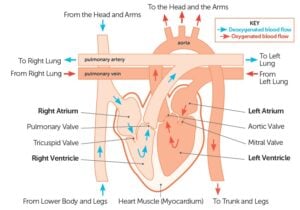Guide to Heart valves
WHAT DO THE HEART VALVES DO AND WHY ARE THEY IMPORTANT?

The heart is divided into four chambers, and for the blood to flow from one chamber to another, there are valves that act as gates. The heart valves open and close to prevent the blood from flowing backwards and to ensure it moves in the correct direction. If there are problems with one or more of the valves, this can affect how efficiently the heart pumps.
Your doctors have found that you have a problem with a valve in your heart as result of it being damaged or diseased.
There are usually two problems that your doctor may say is wrong with the valve:
The valve is stiff, so cannot open and close properly, meaning that the heart has to work harder, having to force the blood to pass through the stiff valve.
This means that the valve leaks. As a result, the heart has to pump harder due to the blood leaking backwards, so it has to do extra work to get the blood to where it should flow.
There are several reasons why heart valves become damaged; you can ask your doctor which of the following has caused your valve to be affected, resulting in your heart not pumping efficiently.
- You may have been born with a damaged valve; this is known as congenital heart disease.
- As we age, our valves can become thickened and deteriorate due to normal wear and tear. This may affect one or more of your valves.
- Regurgitation – If your heart is enlarged because the heart muscle is damaged, it may cause a valve to become stretched and leak blood.
- Rheumatic fever – Your doctors may have asked you if you have ever had rheumatic fever in the past?
- Endocarditis – The endocardium is one of the layers of your heart; you may have an infection that has damaged this layer of your heart and it has infected and damaged the valves.
Your symptoms and a full history of what has been happening to you will have been noted by your team of doctors and nurses. They will have conducted various tests and investigations, in order to diagnose a problem with the valves of your heart. This include various blood tests, X-rays, tracing of your heart (ECGs), scans of your heart (echos) and perhaps angiography (where a dye has been given through one of your veins to show how the blood flows through the heart via X-ray). It may be that the first time your doctor recognised there may be problems with your heart was when they listened to it through a stethoscope. This is when we can hear the blood passing through the valves and can distinguish both which valve and what kind of problem is occurring due to a particular noise.
This will largely depend on the severity of your symptoms. They might be mild, moderate, or severe. It also depends on which heart valves are damaged and how they have affected your heart’s pumping ability, as well as your overall health.
- One option is to replace or repair the affected heart valves. This involves major open-heart surgery, so your doctors will discuss in detail all the implications and whether it is the best option for you.
- If the aortic valve is damaged, you may be offered a Transthoracic Aortic Valve Replacement (TAVI). In this procedure, the surgeon can thread a replacement valve through a blood vessel in your groin or near your collarbone. The replacement valve then sits over the damaged aortic valve. This avoids the need for open heart surgery, although it is still a major procedure. It is a relatively new technique and is not yet available at many specialist centres. However, if other medical conditions prevent you from having major heart surgery, this procedure might be an option for you.
- Regarding medications, your team of doctors may recommend that you stay on medication only. This could be due to your mild symptoms and the fact that no surgery is needed for the damaged valve at this time. If so, they will ensure you have regular check-ups to monitor your valve’s performance, including periodic echocardiograms of your heart. Alternatively, if other medical conditions have impacted your overall health, surgery might be considered too risky. It may also be that the poor functioning of your heart makes any form of surgery impossible. Do not hesitate to discuss any of the treatments mentioned above with your doctors and nurses, as they will have the results of all your tests and investigations, which will give a clear picture of the best options available for effectively treating your heart condition.








